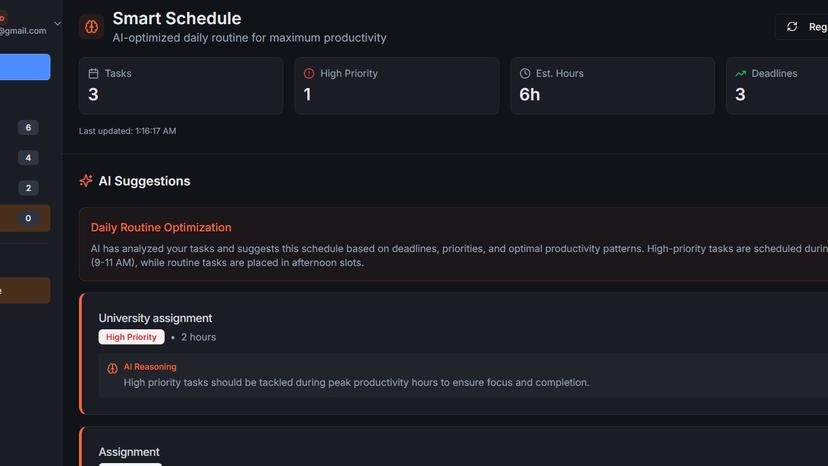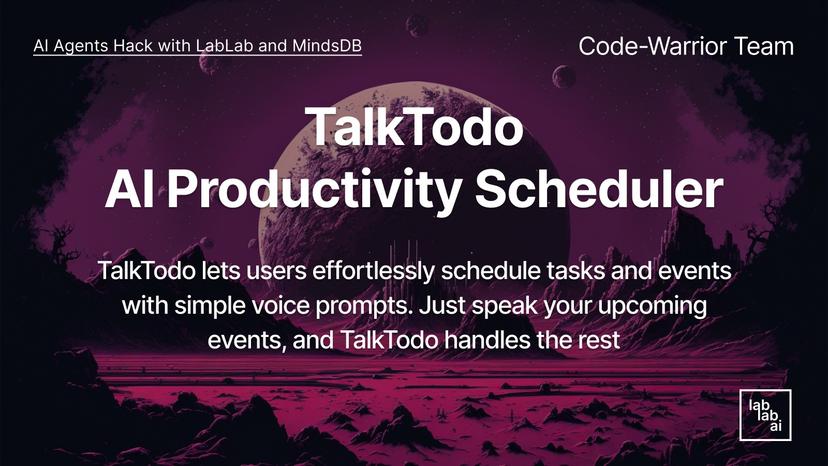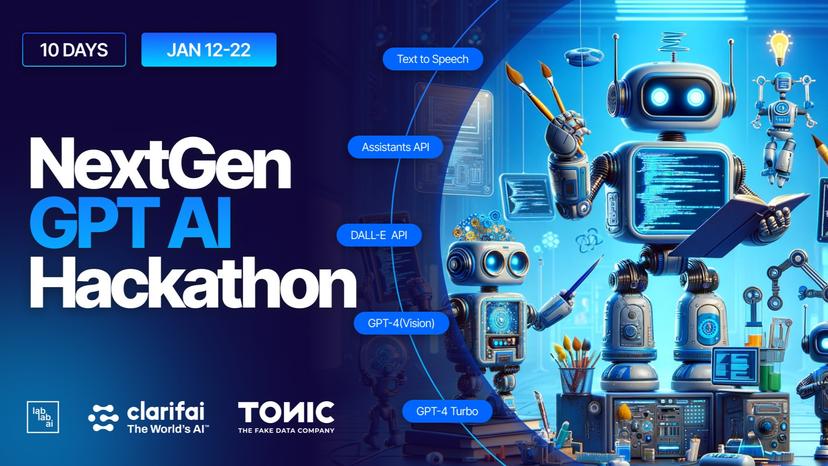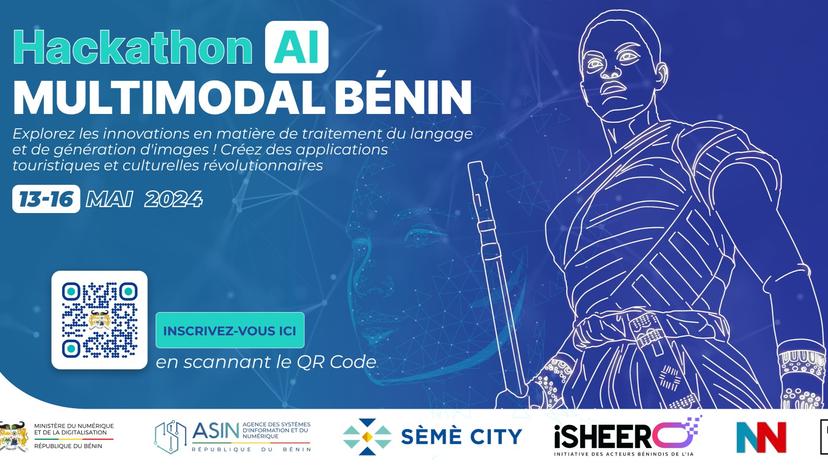
Tayyab Rehan@Tayyabrehan786
is under improvement
40
Events attended
6
Submissions made
Pakistan
1 year of experience
About me
Hello, I'm Tayyab Rehan, a dedicated student passionate about the vast realms of technology. Recently completing my journey with the Python programming language, I'm currently immersed in mastering Data Structures and Algorithms (DSA) and delving into the intricacies of data analysis. Eager to explore the endless possibilities that coding and data can unlock, I thrive on challenges and continually seek to expand my knowledge in the ever-evolving tech landscape. With a foundation in Python and a focus on DSA and data analysis, I'm poised to contribute to innovative solutions and learning experiences. As I navigate my educational journey, I'm enthusiastic about the opportunities to apply my skills and knowledge, and I look forward to the exciting challenges that lie ahead.
is under improvement
🤝 Top Collaborators
🤓 Latest Submissions

AI To-Do List Agent
AI To-Do List Agent is a next-generation productivity application that combines AI intelligence with a clean and modern interface. Built with React.js for a smooth and responsive user experience and Node.js for a scalable backend, the app allows users to create, manage, and prioritize tasks seamlessly. It uses MongoDB for reliable task storage and Firebase for real-time communication and notifications, keeping users updated across devices. The AI agent suggests smart task categorization, detects natural language input (e.g., "Meeting at 5 PM"), and automatically sets reminders. This project aims to help users save time, reduce stress, and stay organized by turning simple to-do lists into a personal productivity assistant. 🛠️ Technologies Used: Frontend: React.js Backend: Node.js Database: MongoDB Communication & Notifications: Firebase AI Features: Intelligent task categorization & natural language understanding
21 Sep 2025

NetOptimize
NetOptimize AI is an advanced AI-powered application designed to streamline telecom policy analysis, network design optimization, and resource allocation. Using cutting-edge Generative AI (Gemini 1.5 Flash) and LangChain, the platform delivers intelligent insights to enhance regulatory compliance, network efficiency, and telecom resource management. Whether you are a policy analyst, network engineer, or telecom strategist, NetOptimize AI empowers you with data-driven recommendations to optimize regulations, infrastructure, and resources efficiently. -->Key Features -> Policy & Regulation Analysis • AI-driven interpretation of telecom regulations for different countries. • Helps identify compliance issues, risks, and opportunities in policy documents. • Provides detailed summaries and actionable insights for policymakers. 📡 Network Design Optimization • Generates custom network architectures based on geographic and operational requirements. • Optimizes coverage, bandwidth, and cost efficiency. • AI-powered design recommendations for telecom providers and ISPs. -> Resource Allocation & Optimization • Smart AI-based resource distribution for telecom networks. • Improves infrastructure planning based on available assets and future goals. • Enhances connectivity, cost savings, and network performance. -> AI-Powered Insights & Decision Support • Uses Generative AI (Gemini 1.5 Flash) for deep learning-based analysis. • Fast and reliable decision-making for telecom professionals. • Provides automated reports and strategic recommendations.
2 Mar 2025

DeepSeek Business Creator
The DeepSeek Business Creator demonstrates how to leverage DeepSeek's latent reasoning space to emulate three-agent interaction for multi-business creation on the web. This system integrates a simple Markov chain optimization process with browser automation, allowing businesses to emerge dynamically in an optimized sequence. The approach enables AI-driven enterprises to launch and scale efficiently, simulating real-world economic expansion with minimal human intervention. From an initial dataset of 200 business ideas, 20 were selected based on predefined success factors. Each of these businesses was assigned three AI agents, each specializing in different aspects of business creation: market research, operational strategy, and adaptive growth. The sequence of business creation was optimized using a Markov chain model, ensuring that dependencies between business types and market readiness were accounted for. This optimization increased the likelihood of success by structuring the order in which AI-driven businesses launched and scaled. AI agents interacted within DeepSeek’s latent space to generate business plans dynamically. These plans emerged from the interplay of three AI agents, refining concepts based on strategic reasoning. Once validated, browser automation was used to execute the launch of these businesses, coordinating their deployment across different online markets. As AI-driven businesses launched, they began to emerge in various markets worldwide. The system's ability to simulate economic scaling in a decentralized manner demonstrated the potential of AI agents to drive real-world business success autonomously. As businesses evolved, AI agents adapted and absorbed the most successful strategies. The agent absorption rule ensured that underperforming agents were phased out, while the most effective decision-making patterns were integrated into the next generation of business iterations.
16 Feb 2025

AI Daily Productivity Planner
The AI Daily Productivity Planner is a smart scheduling assistant designed to improve time management and productivity. By analyzing users' tasks, deadlines, and available time, it generates personalized daily schedules that prioritize tasks based on urgency and importance. The AI agent can also recommend optimal times for breaks, exercise, and other activities, ensuring a balanced workflow. Users can input tasks via text or voice, and the system adapts dynamically throughout the day based on progress or changes in priorities. The tool integrates seamlessly with calendars and other apps, helping users stay on track while promoting a healthier work-life balance.
16 Sep 2024

Yoruba Image Synthesis - Multi-Modal Fusion
In this project, we confront the linguistic barriers faced by Yoruba speakers due to limited language resources. Image generation models primarily excel with English prompts, posing a challenge for non-English speakers. To address this, we embarked on a dual-track approach: data collection and model development. Firstly, recognizing the scarcity of Yoruba datasets, particularly in image generation prompts, we meticulously curated our own dataset. English sentences were carefully selected to serve as image generation prompts and then translated into Yoruba using a dictionary-based approach. Next, we developed a custom translator model trained specifically to translate Yoruba into English. This intermediary step ensures seamless integration with image generation models, allowing for smoother operation and accurate results. Through rigorous testing, we achieved an impressive 85% accuracy on the test set, affirming the efficacy of our approach. The core strength of our project lies in its ability to empower users to generate images in their native language without encountering language barriers. By collecting our own data and training custom models, we circumvent the limitations imposed by the scarcity of Yoruba resources. Leveraging the SDXL API for image generation further enhances the user experience, ensuring high-quality outputs. Looking ahead, we envision extending our efforts to include additional languages such as Fon and Dendi, expanding our dataset and catering to a broader audience. Furthermore, our ultimate goal is to develop a model capable of directly generating images from Yoruba, Fon, and Dendi without the need for translation into English. In summary, our project not only addresses a pressing need within the Yoruba-speaking community but also lays the groundwork for future advancements in multi-lingual image generation. Through our innovative approach, we pave the way for inclusive, barrier-free communication and creative expression.
16 May 2024

FactChecked
In finance, facts need to be thoroughly checked and help in the decision-making of a company or individual. 1. Accuracy: Financial decisions are based on numbers and data, so the information must be accurate. Incorrect data can lead to flawed analysis and misguided decisions. 2. Risk Management: Making decisions based on unreliable information can increase the risk of financial losses. Individuals and companies can better assess and mitigate risks by thoroughly checking facts. 3. Compliance: Many financial decisions are subject to regulatory requirements. Ensuring the accuracy of information helps to comply with legal and regulatory standards, reducing the risk of penalties or legal issues. 4. Reputation: Inaccurate financial information can damage the reputation of individuals or companies. Stakeholders, such as investors, lenders, and customers, rely on accurate financial reporting to make their own decisions. 5. Strategic Planning: Fact-checking supports strategic planning by providing a reliable foundation for forecasting and setting goals. Without accurate information, strategic decisions may be based on faulty assumptions. 6. Resource Allocation: Fact-checking helps optimize the allocation of resources. By accurately assessing financial data, individuals and companies can allocate resources more efficiently, maximizing returns and minimizing waste. In conclusion, thorough fact-checking is a fundamental aspect of financial decision-making. It ensures accuracy, reduces risk, facilitates compliance, protects reputation, supports strategic planning, and optimizes resource allocation.
13 Feb 2024











